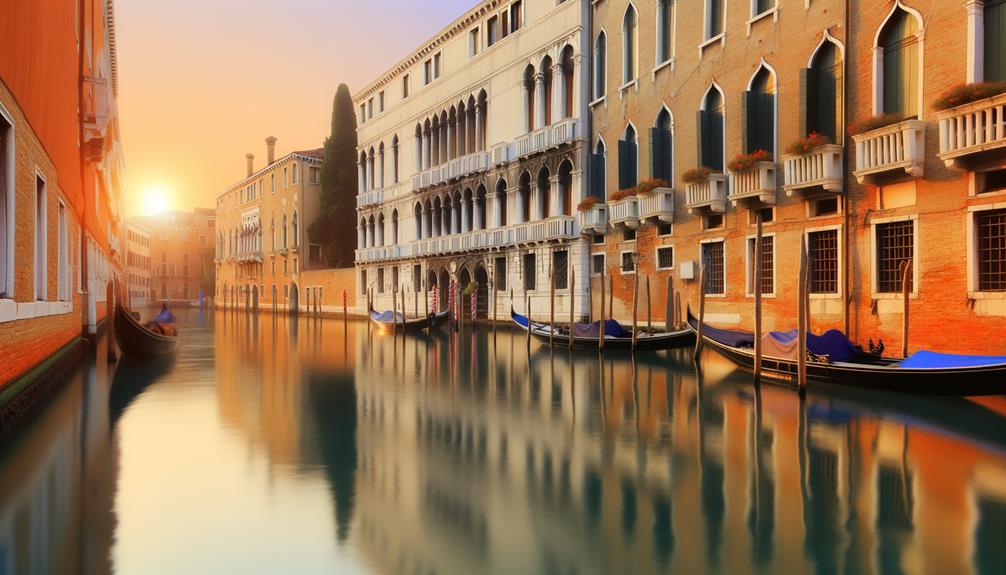Meaning of the Name Venice
The name 'Venice' originates from the ancient Veneti people, linked to the Proto-Indo-European root *wen-, meaning 'to endeavor' or 'to desire.' Emerging as 'Venetia' in Latin and evolving into 'Venezia' in Italian, the city's name encapsulates its storied past. Founded in the 5th century AD, Venice evolved from a sanctuary to a mercantile powerhouse.
Its linguistic journey captures influences from Latin, Greek, and Byzantine cultures. The name reflects a historical narrative rich with trade, cultural exchange, and resilience.
Exploring further will reveal more about its intriguing evolution and the cultural significance that shaped Venice into the city it is today.

Key Takeaways
- The name Venice originates from the ancient Veneti people, derived from the Proto-Indo-European root *wen- meaning 'to desire'.
- 'Venetia' in Latin evolved into 'Venezia' in Italian, encapsulating the city's historical and cultural journey.
- Greek historian Herodotus mentioned the Eneti, who are likely linked to the Veneti, further tracing the name's etymology.
- Venice's name reflects its rich history as a resilient and adaptive mercantile hub since the 5th century AD.
- The linguistic evolution of Venice's name mirrors its diverse cultural interactions and influences over centuries.
Etymological Roots
Venice's etymological roots trace back to the ancient Veneti people who inhabited the region during the Iron Age, providing the city its enduring name.
The term 'Veneti' is derived from the Proto-Indo-European root *wen-, meaning 'to endeavor' or 'to desire,' reflecting the aspirations of these early inhabitants.
Linguistic analysis indicates that the Latin name 'Venetia' emerged from this root, which later evolved into 'Venezia' in Italian. This transformation underscores the city's enduring connection to its ancient origins.
Additionally, the Greek historian Herodotus mentioned the Eneti, a tribe likely linked to the Veneti, highlighting the region's historical prominence.
Therefore, the name Venice encapsulates a rich tapestry of cultural and linguistic evolution, rooted deeply in antiquity.
Historical Context
Situated at the crossroads of trade routes and maritime dominance, the city of Venice emerged as a pivotal power in the Mediterranean world, reflecting its strategic importance and dynamic history. Founded in the 5th century AD, Venice developed from a refuge for mainland inhabitants fleeing barbarian invasions into a thriving mercantile hub. Its lagoon provided a natural defense, fostering a distinct Venetian identity intertwined with commerce and navigation.
| Period | Event | Significance |
|---|---|---|
| 5th Century AD | Founding of Venice | Refuge for mainland inhabitants |
| 9th Century AD | Establishment of the Venetian Republic | Rise as a maritime power |
| 13th Century AD | Peak of Venetian Trade and Territorial Expansion | Dominance in Mediterranean trade |
The city's name, derived from the ancient Veneti people, embodies a legacy of resilience and adaptation.
Linguistic Evolution
As the historical significance of Venice took shape through its maritime prowess and strategic location, the linguistic evolution of its name reveals a rich tapestry of cultural and etymological influences.
The name 'Venice' is derived from the ancient Veneti people who inhabited the region. Over centuries, the name transformed through various linguistic stages, reflecting interactions with diverse cultures and languages.
- Latin Influence: The Latin term 'Venetia' denoted the region.
- Greek Connection: The Greeks referred to it as 'Venetía,' indicating Hellenistic interactions.
- Byzantine Era: Byzantine control introduced variations in pronunciation.
- Medieval Evolution: Medieval Latin texts often used 'Venecia.'
- Modern Usage: The contemporary Italian 'Venezia' and English 'Venice' emerged.
This linguistic evolution underscores the city's dynamic historical narrative.
Cultural Significance
The cultural significance of Venice is deeply intertwined with its historical role as a nexus of trade, art, and diplomacy. This has left an indelible mark on its linguistic and cultural identity. From the Venetian Republic's peak during the Renaissance, the city became a melting pot of various cultures and languages. This confluence is evident in Venetian dialect, which incorporates elements from Latin, Greek, Arabic, and other languages.
Venice's strategic position fostered not just economic prosperity but also an unparalleled cultural exchange, influencing art, architecture, and music. The unique socio-political structure of Venice, with its elected Doge and patrician governance, further cemented its reputation as a beacon of innovation and cultural vibrancy, resonating through the centuries.
Literary References
The name Venice has permeated literary history, especially through Shakespeare's portrayal of the city in works such as 'The Merchant of Venice' and 'Othello,' which underscore its association with trade, cultural intersections, and complex human narratives.
In modern literature, Venice continues to symbolize a fusion of romance and decay, serving as a backdrop for intricate plots and character studies.
Examining these literary references provides a nuanced understanding of how the city's identity has been constructed and reimagined through the ages.
Shakespeare's Venetian Influence
Shakespeare's profound engagement with Venetian culture and society is evident through his nuanced portrayal of Venice in plays such as 'The Merchant of Venice' and 'Othello.'
His works reflect a deep understanding of the city's complex socio-political landscape, linguistic richness, and mercantile significance. This engagement manifests through:
- The depiction of Venice as a cosmopolitan hub of commerce and culture.
- Characters like Shylock and Othello, who embody the city's ethnic and religious diversity.
- Exploration of Venetian law and justice, highlighting societal tensions.
- The use of Venetian settings to enhance dramatic tension and thematic depth.
- Linguistic choices that reflect the city's multilingual environment.
Shakespeare's portrayal illuminates Venice's multifaceted identity, rooted in historical and cultural contexts that resonate beyond his era.
Venice in Modern Literature
Contemporary literature frequently invokes Venice as a symbol of mystery and decadence, drawing upon its rich historical tapestry and linguistic heritage to explore themes of identity, transformation, and the passage of time.
Authors like Ian McEwan in 'The Comfort of Strangers' and Donna Leon in her Commissario Brunetti series utilize Venice's labyrinthine canals and decaying grandeur to reflect inner turmoil and societal decay.
The city's etymological roots, from the Latin 'Venetia,' meaning 'love,' also imbue narratives with layers of romanticism and nostalgia.
This duality, where Venice serves as both a cradle of beauty and a site of inevitable decline, resonates deeply in modern literary works, offering a fertile ground for nuanced character studies and existential musings.
Modern Interpretations
In examining the modern interpretations of the name Venice, one must consider the linguistic evolution and cultural significance that have shaped its contemporary understanding. Derived from the ancient Veneti people inhabiting the region, the name has undergone significant transformations over centuries.
In the present day, Venice conjures various meanings and associations:
- Historical Heritage: The city's rich past as a maritime power.
- Architectural Marvel: Renowned for its unique canals and buildings.
- Cultural Symbolism: Representative of art, music, and literature.
- Tourist Destination: A major attraction for global visitors.
- Environmental Concerns: Highlighted by the issues of rising sea levels.
These modern interpretations reflect a complex interplay of history, culture, and contemporary issues, offering a multifaceted view of Venice's enduring legacy.
Conclusion
The name 'Venice' emerges as a linguistic marvel, tracing its etymological roots to ancient times, evolving through centuries of rich historical and cultural significance. It encapsulates the essence of a city that has been a beacon of art, literature, and maritime prowess.
The myriad literary references and modern interpretations only underscore its timeless charm. To say that Venice's name is a mere label would be an understatement; it is an emblem of an unparalleled cultural legacy.






